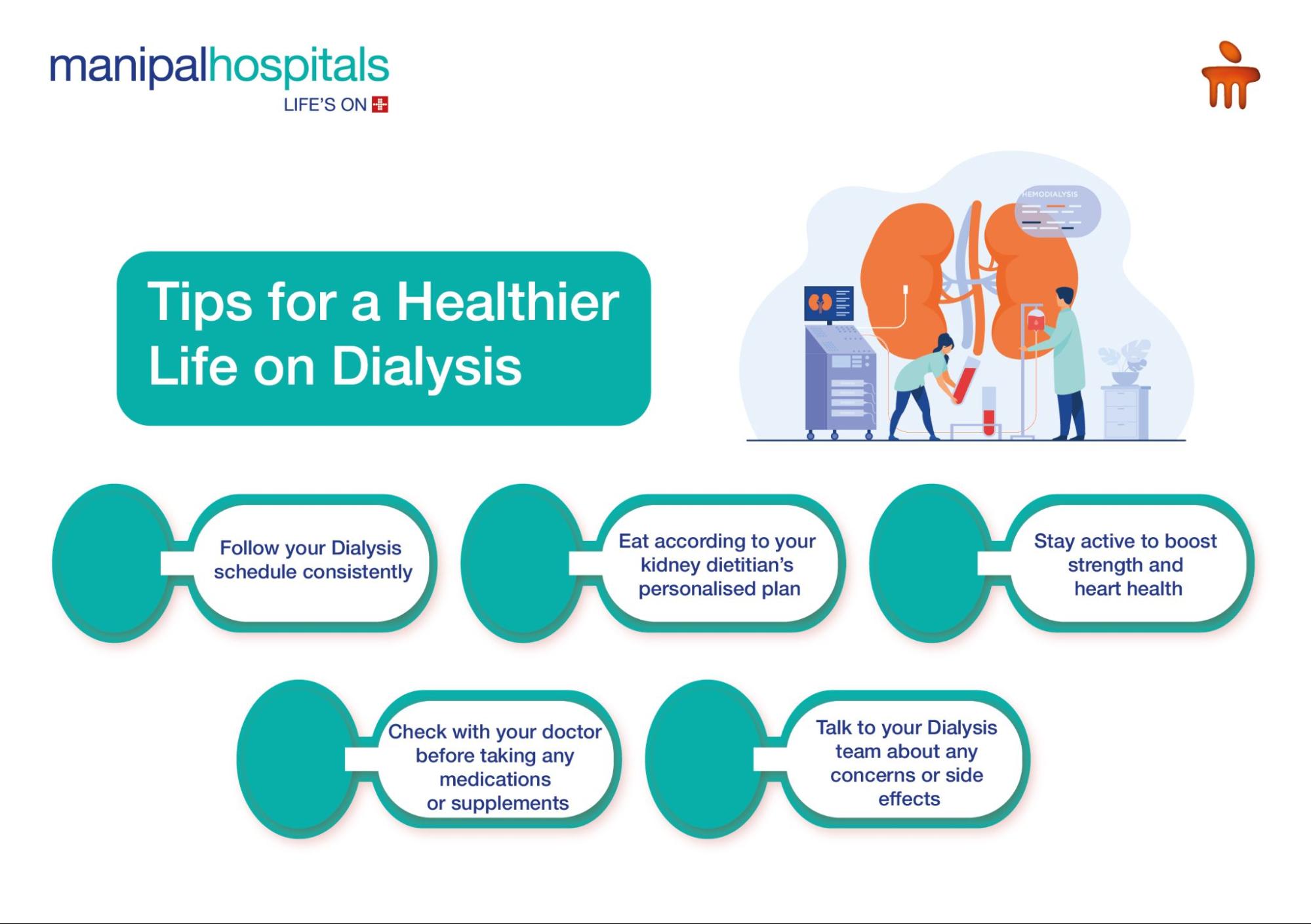Dialysis helps remove excess fluids and waste from the blood when the kidneys can’t function properly. It is an option when kidney disease becomes severe and your kidneys can no longer support your body. A 2018 report estimates that India has one of the highest numbers of chronic Dialysis patients worldwide.
Dialysis partially takes over the job of healthy kidneys, which naturally remove fluid and waste around the clock. However, Dialysis can only perform about 10-15% of a normal kidney's function. This blog will cover when Dialysis is required, how it works, and its different types.
Synopsis
When is Dialysis Required?
Dialysis becomes necessary when the kidneys fail to function effectively, a condition called kidney failure. Chronic kidney disease is the leading cause of kidney failure. Other causes include acute kidney disease, polycystic kidney disease, glomerulonephritis, nephrotic syndrome, and lupus nephritis.
Signs and symptoms of kidney failure include:
-
Fatigue or difficulty focusing
-
Sleep disturbances
-
Dry, itchy skin
-
Blood in urine
-
Loss of appetite
-
Changes in urination frequency
-
Mental fog or reduced clarity
-
Foamy urine
-
Swollen feet and ankles
If you are experiencing the above symptoms, your doctor may advise you to undergo certain tests. Doctors diagnose kidney issues using a combination of blood and urine tests, including creatinine levels, glomerular filtration rate (GFR), and albumin-to-creatinine ratio.
They may also use imaging tests like ultrasounds and, in some cases, perform a Kidney Biopsy for further evaluation. After a kidney failure diagnosis, your doctor may recommend Dialysis. The timing of Dialysis depends on factors such as your age, energy levels, overall health, lab results, and readiness to follow a treatment plan.
How is Dialysis Done?
Dialysis is done in 2 main ways: Hemodialysis and Peritoneal Dialysis
-
Hemodialysis: Hemodialysis is filtering the blood of a person whose kidneys are not working normally. This type of Dialysis removes waste like creatinine, urea, and excess water from the blood when the kidneys fail. It helps maintain salt and water balance in the body.
During Hemodialysis, a tube is connected to a needle in your arm, allowing blood to flow into an external machine for filtering. The cleaned blood is then returned to your body through another tube. Dialysis centres typically perform this process three times a week, with each session lasting about four hours.
-
Peritoneal Dialysis: This Dialysis uses the peritoneum, the lining of your abdomen, as a natural filter to clean your blood.
During this procedure, a soft plastic tube (catheter) is surgically placed in your abdomen. A sterile cleansing fluid is introduced through the catheter, and once the filtering process is complete, the fluid drains out through the same tube.
Is Dialysis Painful?
If you are on Hemodialysis, you may feel some discomfort when needles are inserted into your fistula or graft, but most patients have no other issues. In Peritoneal Dialysis, abdominal pain or discomfort may occur, sometimes indicating an infection.
However, Dialysis is a painless procedure. Some patients may experience a drop in blood pressure, leading to nausea, vomiting, headaches, or cramps. These side effects can often be prevented by following your kidney diet and fluid restrictions.
Living With Dialysis
Living with Dialysis means managing a chronic condition with regular blood-filtering treatments. However, with proper care and adherence to treatment from a Nephrologist, many people lead long, active lives.

Here are some helpful tips to enhance your quality of life while on Dialysis:
-
Stick to your Dialysis schedule
-
Follow the personalised eating plan recommended by your kidney dietitian
-
Stay physically active to improve strength and heart health
-
Consult your Dialysis provider and pharmacist before taking any medications, supplements, or other products.
-
Discuss any concerns or side effects with your Dialysis team
Conclusion
India has one of the highest numbers of Dialysis patients globally, as many people suffer from kidney failure. Dialysis helps individuals with kidney failure lead longer, healthier lives, but it also comes with risks. Following a proper diet, staying active, and adhering to medications can help minimise these risks. For more guidance on this procedure, visit Manipal Hospitals, Bhubaneswar.
FAQ's
The 4 types of Dialysis are In-Centre Hemodialysis, Home Hemodialysis, Peritoneal Dialysis and Continuous Renal Replacement Therapies.
Yes, Dialysis centres are there in many Indian cities. However, before travelling, schedule an appointment at a centre close to your destination. Your Dialysis centre staff can help with arrangements.
The duration depends on the type and individual needs. Hemodialysis usually takes about four hours per session, three times a week, while Peritoneal Dialysis requires daily treatments lasting several hours.
On average, Dialysis patients live 5–10 years, but some can survive for 20–30 years with proper care.
You can schedule an appointment with a nephrologist at Manipal Hospitals, Bhubaneswar, by contacting us or visiting our website.
Visit: https://www.manipalhospitals.com/bhubaneswar/specialities/dialysis/
Contact no: 0674 666 6600



















 5 Min Read
5 Min Read










